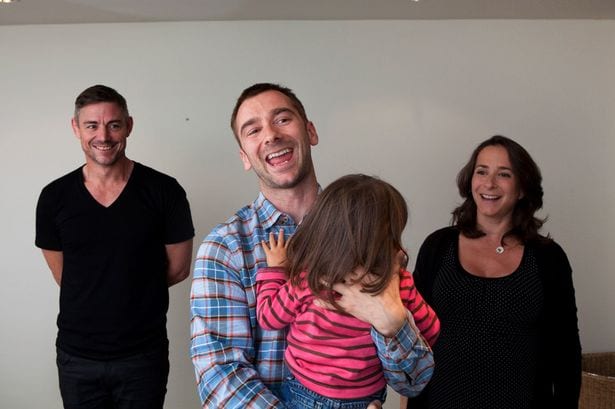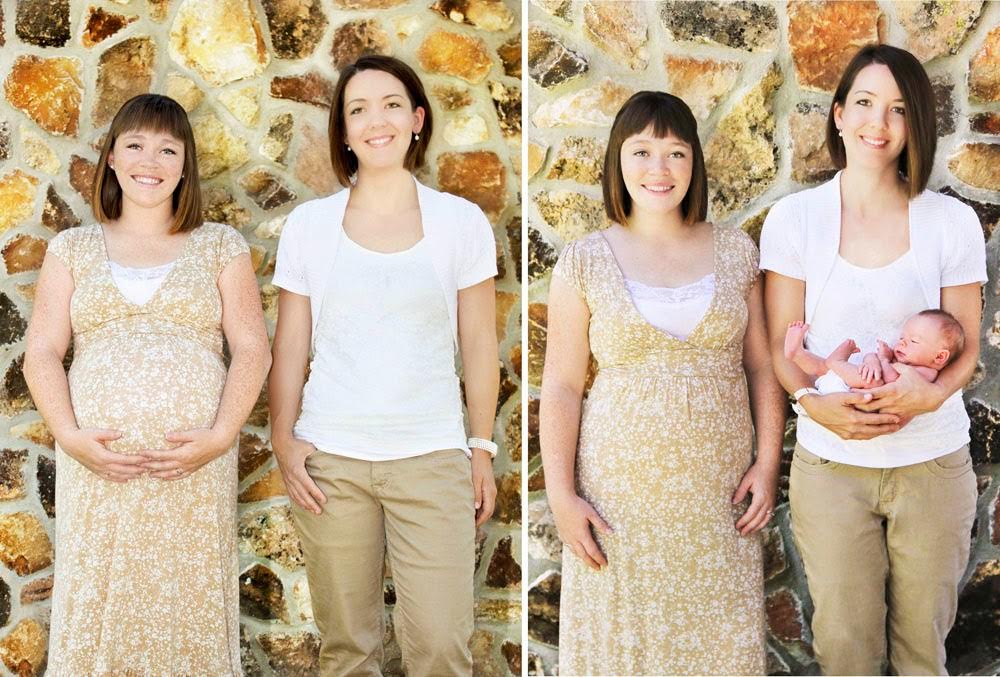Meeting with a potential surrogate is like the most awkward first date imaginable. You’re face-to-face with a woman you barely know, and both of you spend most of the time talking about making a baby together. Talk about rushing things. There are probably a million things you want — and need — to know. I’ve seen some websites that suggest you approach your surrogate with a massive checklist of questions, many of which are not exactly subtle, like:
“Do you smoke?”
“Are you sexually active?”
“What were the results of your last pap smear?”
Sure, those are great things to ask… if you want the surrogate to throw a drink in your face and slap an instant “No Vacancy” sign on her womb.
Remember, this isn’t a job interview. She can reject you, too, and if you treat her like an employee or a menial laborer, she probably should.
Don’t worry, if there are any red flags, they’ll turn up in her medical and psychological exams, and you’ll be made aware of them by a professional, neutral third party.
When you sit down face-to-face with a potential surrogate, try to empathize with what she’s going through. After a huge amount of deliberation and soul searching, she’s decided to do something incredibly generous, terrifically inconvenient, and more than a tiny bit risky, for a virtual stranger. She’s nervous to meet that stranger, but also a bit thrilled.
Then you come in and ask about her pap smears.
So what should you discuss in your first meeting? First and foremost, it’s time to take the mystery out of your relationship and just get to know each other. If things go well, you’ll be creating a life together.
That being said, it’s not exactly a first date. You need to check your compatibility on some pretty weighty matters.
If you’re working with an agency such as Shared Conception, much of this subject matter will be covered by them, but if not, these are the questions you need to ask, in increasing order of unpleasantness.
1. What made you want to be a surrogate? No one’s going to reply, “I need the money,” and if they do, you should probably run away as fast as you can. Sure, the money is a nice perk, but with all a surrogate goes through, she’s going to earn that cash, and it is a limited sum. No one’s getting rich as a surrogate, so it’s a safe bet she has bigger motives.
Raising this basic topic is a great way to get to know your surrogate and to show her that you appreciate the sacrifice she’d be making on your behalf.
2. What were your other pregnancies like? Again, the medical exam will clue you in to any relevant technical info, so try to keep this as light as possible. How bad did her babies kick? Did she get morning sickness? You may not know very much about the surrogate at this point, but you know she’s been pregnant before (at least in most cases, since most gestational carriers have a proven history of successful pregnancies).
You, on the other hand, in all likelihood have never been and never will be pregnant. Show some curiosity and empathy by asking her to describe exactly what she’d be going through for your benefit. This is also a great way to show you appreciate the sacrifice she’ll be making on your behalf.
And if you find out pregnancy makes her crave pickles and ice cream, file that away. Someday, when she’s carrying your child, you’ll know just what to put in her care package.
3. How do your friends and family feel about you being a surrogate? Surrogacy is physically and emotionally demanding, and no one can do it alone. Make sure she has a good support system, people who care about her who appreciate what an amazing thing she’s doing. If she’s religious, it’s very helpful if her spiritual leader is on her side as well.
4. Are you comfortable with me/us being in doctor’s appointments and the delivery room? Obviously, let the surrogate know that you’ll respect her privacy as much as possible. But one of the main benefits of having a baby with a surrogate is being able to participate in all the exciting prenatal moments, like finding out the baby’s sex or seeing him or her for the first time on a sonogram monitor.
Most surrogates will fully anticipate and welcome your participation in the process, but raising the issue in a polite and respectful manner will set the right tone for when those intimate moments inevitably arise.
5. What kind of communication would you like to maintain after the birth? There’s no correct answer to this. Some surrogates and intended parents want to stay in close touch. Others might want to be your Facebook friend so they can see pictures of your kids growing up. Still others may be content merely to get a holiday card every December. As long as both parties are on the same page, anything can work.
It’s important to reiterate that your surrogate will have no legal rights to your child. Once your baby is born, you are well within your rights to cut off all contact with the surrogate and never see her again. This kind of clean break only really happens in extreme circumstances…but it happens. Most people and their surrogates form a bond through the process and want to stay in touch afterward.
Once your child is old enough to understand how he or she came into the world, they’ll likely be curious about who their surrogate was, so it helps if you’ve kept up the relationship.
6. How many fetuses are you willing to carry? This starts getting sensitive and Shared Conception is here to help you navigate these waters. The more fetuses involved in your pregnancy, the higher the risks. A woman carrying triplets is almost always put on bed rest. It’s not surprising then that many surrogates limit the number of babies they’re willing to carry to one or two.
7. Would you be willing to undergo a selective reduction? Here’s where the questions start to get really dicey. Even if your surrogate only wants to carry one baby and you only want to have one kid, you may still want to transfer multiple embryos to increase the odds that one of them attaches.
So what happens if your surrogate becomes pregnant with two or three embryos? In that case, she may undergo a selective reduction, where excess embryos are removed from her uterus at a very early stage, leaving only the number of babies you’re willing to have. This is obviously a very tricky ethical situation, so for everyone’s benefit, it’s important to make sure you’re on the same page.
8. If we were to decide, due to complications with the fetus, to terminate the pregnancy, would you be willing to do so? You and the surrogate are both entering into this agreement with the same goal: to make a baby. Neither of you wants to think about terminating a pregnancy, because that goes against the very reason you’ve come together.
However, everyone knows that things do sometimes go wrong, and the baby will be yours, not hers, so if there are complications and you become concerned with what your child’s quality of life would be, it should be your call to make.
There are people — surrogates and intended parents alike — who would never terminate a pregnancy under any circumstances. That’s fine, of course, but if you feel that way, it’s good to have a surrogate who would defer to your judgment in the case that your feelings change.
Again, no one wants to think about the worst case scenario. You both want a healthy baby. So bring this up now, and then forget about it. Hopefully, it won’t end up being an issue.
9. What concerns do you have about us or this process? You never know what your surrogate may be thinking or how you may come across to her. She might have a special request that’s very important to her or a fear she’s working to get over.
One surrogate had two requests: One, she wanted an epidural, because she went without one when her son was born and didn’t want to do that again. And two, she wanted to make sure that she wouldn’t be handed the baby in the delivery room. When doctors first handed her her son, that’s when she bonded with him. To make sure to establish the right boundaries, she didn’t want to see the baby until later on, when she was in the recovery room.
Let her know that her concerns are important to you, and in case she does have a vastly different idea of how the birth should go, it’s better to find out now rather than a trimester or two into the pregnancy.
Hopefully, you’ll find plenty of common ground with your surrogate on these topics, because once you’ve discussed them and agreed about the important things, you’ve earned the right to never discuss them again. In all likelihood, you won’t have to, and now that you’ve gotten past the tough stuff, you can talk about things that don’t really matter: what her favorite sports teams or TV shows are, what kind of sense of humor she has and what she thinks of the baby names you’ve picked out.
Then, finally, you’ll know for sure if you’ve found “The One.”

SURROGATES AND POST-PARTUM BLUES
While a surrogate may not necessarily have post-partum depression, giving birth is still an incredibly turbulent, emotional time, and this can be amplified by the situation. Surrogates will likely tell you there are a multitude of reasons why they’re not feeling their usual selves post-birth, and generally, it has nothing to do with giving the baby to the parent(s).
Here are a few common reasons a surrogate may be feeling blue:
Contact with the parent(s) has dropped off after the birth. Toward the end of a surrogate pregnancy, there is an insane amount of excitement, a flurry of activity as everyone prepares for the birth, and the surrogate is usually in frequent contact with the parent(s) nearing the end. In some cases, every day. After the birth, the parent or parents are usually adjusting to having a baby in the house for the first time, or a new addition to their family. This usually means they can’t keep up the level of contact they had before the birth, and it tends to drop off. Sometimes this drop-off is permanent, other times it’s merely temporary. Usually, she’s not getting as much contact as she did right before the birth, but that is incredibly situational, and depends on the surrogate and IP(s). Logically, the surrogate understands and acknowledges the reason for the decline, but it can still be a little much to absorb when they have such a rush of hormones going through their bodies.
Going through postpartum recovery with no baby. This has more to do with not having that cute and cuddly distraction on hand to keep her mind off the pain and helping move forward with her daily routine. Another common misconception is that recovery should be easier without a baby around, because, well, they don’t have a baby to take care of! In some ways this may be true, (no crying in the middle of the night for a diaper change), but for the most part it isn’t. Her body is still in major recovery mode, either from a vaginal birth or C-section, and it still takes the same amount of time for that recovery to happen. Some surrogates will feel like major slackers because they don’t have the added responsibility of taking care of a baby, and will get a little sad when they can’t keep up with day-to-day living. They might even push themselves to do too much, too soon, because people know she doesn’t have the baby, and she feels the need to meet their expectations.
Feeling less attractive, physically. No one thinks twice, or at least no one with any sense, about how a woman’s body looks after she’s given birth. The testament to her hard work and weight gain is staring at you, with the most adorable cheeks in the cutest onesie this side of the Earth. For surrogates, however, this isn’t the case, and it can be somewhat intimidating to go out in public with our post-baby bodies with no proof of how we achieved them. Even family or work functions can have this effect, because for some reason there are people who believe that, because the baby isn’t hers, the last nine months of baby body should magically disappear. Unfortunately, this isn’t the case.
Loss of identity. This one is generally the most bittersweet of all because a surrogate is faced with the fact that her part in the journey is, essentially, over. Yes, there is usually contact, visits, pictures, updates, and so on, but her part in the orchestration of creating life is finished. It’s the ending of a chapter, and any future chapters will see her playing a much more minor role than before. Think along the lines of a child leaving home to set out on their own, being independent of their parent(s), and it is somewhat close to that.
Shared Conception gets it. We understand all of the above-mentioned emotions and are ready to walk our surrogates through it all. Give us a call today and learn about surrogacy.

Celebrating Surrogacy!
The miracle of surrogacy would not be possible without individuals, who despite being unable to have children on their own, are determined to build loving, wonderful families of their own. And it wouldn’t be possible without mothers, who recognize the power of parenthood, answering the call to become surrogates.
We are honored that, our surrogacy agency, Shared Conception, have been able to be a part of creating your families and being a part of your lives. There’s not a day that goes by where we don’t think about how spectacular the last couple of years have been and we are excitedly looking forward to the future.
The act of even deciding to consult with a surrogacy agency is a well-thought out decision that we take seriously. We understand the excitement, trepidation, nervousness and happiness that comes with picking up the phone or dropping us an email. To that end, expect us to be compassionate, straightforward, honest and transparent about our surrogacy process. We have the same high expectations and wish for a successful outcome just like you do. We celebrate you, the intended parent, you the potential surrogate and we celebrate surrogacy!
For individuals who are interested in becoming parents through surrogacy, more information is available at http://sharedconception.publishpath.com/parents.
For women who are thinking about becoming a surrogate, there is more information at http://sharedconception.publishpath.com/surrogates.
To keep up with our latest news in surrogacy, find us, Shared Conception, on Facebook.

Happy 2017 to You!
Here at Shared Conception, we wish you well as we turn yet another chapter in our journey of life, and keep living to our fullest potential.
Our surrogacy agency researched* and found the "Top 10 New Years Resolutions." Do they match up with any of your personal New Years resolutions?
1. Lose Weight
2. Getting Organized
3. Spend Less, Save More
4. Enjoy Life to the Fullest
5. Staying Fit and Healthy
6. Learn Something Exciting
7. Quit Smoking
8. Help Others in Their Dreams
9. Fall in Love
10. Spend More Time with Family
At our surrogacy agency, our chief goal is #8, "help others in their dreams." As an Intended Parent or someone thinking of becoming an Intended Parent, now is a great time to finally make your dream of becoming a parent come true. Now, is the time to research what it means to use a surrogacy agency and how to successfully navigate the role of being an Intended Parent. Making the first step can lead to you, hopefully, cradling your newborn soon!
As a surrogate or a surrogate mother, you also have the opportunity to literally "help others in their dreams." Imagine being able to give the gift of a baby, the gift of life to a family who so yearns to parent and lovingly raise a child. Now is the time for you to start researching what it means to have a baby for another family. Now is the time to start prepping your body (through a healthy diet and exercise) to carry a baby. Now is the time to call a surrogacy agency and start the screening process.
It's such a treat to start the new year with a clean slate, let's intentionally write the words to our own life story. Peruse the above-mentioned resolutions (pay close attention to #8!), and determine how this new year will unfold for you and your family.
Happy new year!

10 Reasons Being a Surrogate is Amazing!
1. You get to give one of the greatest gifts anyone can ever give. From the moment children come into our lives, our world changes for the good. We are suddenly filled with enormous amounts of love and devotion for a tiny little being. Their first smile, first giggle, first step and first word are just a few of the simple, but extraordinary treasures that make parenthood an amazing and rewarding experience. Helping someone else experience these treasures is one of the greatest gifts anyone can give.
2. You’ll form a lifelong bond, a connection that is like no other. The surrogacy process creates an intimate link that binds the lives of the intended parents, the surrogate and the child. The relationship created through the surrogacy process is one that our surrogacy agency, Shared Conception, takes exceptional care to respect and maintain throughout the journey.
3. Receive financial compensation for helping a family in need. Receive financial compensation to help you and your family.
4. Choose who you want to work with. Intended parents come from around the world and all kinds of backgrounds. During the application and screening process, surrogates have the opportunity to express whom they would like to work with. Shared Conception’s matching process involves the mutual exchange of profiles and an introductory Skype video call so you can be sure you’re comfortable with the couple or individual you will be working with.
5. Gain a sense of pride and accomplishment that you take with you the rest of your life. Becoming a surrogate and helping another family achieve their parenthood dreams is an amazing act of kindness. These intended parents wouldn’t have a child if it weren’t for your desire to help. You will have a sense of pride that you helped another family fulfill their dream for the rest of your life.
6. Have the support you need 24/7 from the beginning to the end. Every step of your surrogacy journey–from the IVF process, pregnancy, delivery and post-delivery–will be carefully guided and coordinated by our experienced team. In addition to the support from your intended parents, you can be sure our surrogacy agency will be cheering you on!
7. Help create families of all backgrounds. Shared Conception works with both heterosexual and LGBT intended parents. During the application and screening process, surrogates have the opportunity to let us know whom they would like to work with.
8. Set a good example for your children and community. Show your children and community the unselfish act of kindness of helping another family.
9. Help make dreams come true. Women who choose to become surrogates do so out of a sincere compassion to help a couple or individual have a child. They realize that nothing fulfills a person’s life more than being part of a family. They might not realize it, but they make dreams come true.
10. Last but certainly not least, become a part of an amazing group of women – the surrogate mother community. Be a part of a community of some amazing, selfless, compassionate women helping to create little miracles for others.
What did we miss? Tell us what you think are the best reasons being a surrogate is great!

Why Give Surrogacy Gifts?
It is common to give surrogacy gifts to both surrogate mothers as well as to intended parents. (And don’t forget the surrogate babies!) From gift baskets and surrogacy t-shirts to commemorative trees and Kodak photo books, there are countless gifts for all parties involved!
A surrogate journey, ending with the birth of a baby, is in itself a gift, for everyone. No material gift could compare for anyone involved, including the surrogate.
Gift giving, however, is a very common custom in many families and cultures. Surrogacy is no exception.
Many surrogate mothers and intended parents would like to give surrogacy gifts to one another as symbols of their friendship, extreme gratitude, as a welcoming gift or just as a thank-you.
Not every surrogate pregnancy involves gift giving, but most do.
Gifts can be surrogate mom gifts, gifts for intended parents, for the surrogate babies or even the surrogate mother’s children. They do not have to be expensive. Remember, it’s the thought that counts. Happy gift-giving and happy holidays from all of us at our surrogacy agency, Shared Conception!=

Top Ten Things to be Grateful for this Season
This season makes most of us naturally think of giving thanks for everything in our lives. Here at our surrogacy agency, Shared Conception, we truly think that there is much more to be thankful for than we initially assume.
Family
Okay, now we know this is a very popular and cliché answer, but ask yourself these questions: What does my family do for me? Where would I be without them? Are they supporting your surrogacy or your intended child? It is the unconditional love that exists between the members of a family which makes these relationships so incredible. Please do not take one moment for granted while you are with your family this holiday season! And also, do not be afraid to express your gratitude to them whether in person, via text, by letter or a quick phone call. It will mean the world to them.
Friendships
These are other relationships that go unnoticed and unappreciated all of the time. When was the last time you said “Thank you!” to your best friend for always texting you back or replying to your Facebook posts? It goes without saying that our friends put up with a lot for us, and they still love us anyways. After all, how many times have you texted or called them regarding your pending surrogacy journey? This season try to thank your friends with a simple note or hug to let them know that you really do care.
A Peaceful Home
We understand that your own home may not be literally "peaceful" but take a moment to understand how blessed you are to live where you do. Many people across the world are living in areas of poverty, mass destruction, and immoral chaos. Do not take this blessing lightly anymore. Instead, be thankful for every moment, even the most frustrating.
Happiness and Laughter
There is no greater gift than a smile. During this time of year, soak up every laugh and giggle you can. Be thankful for the happiness you are able to share with those around you and share that with the world around you. You never know who needs a smile, and you could definitely brighten someone’s day by flashing those white sparkly teeth their way.
Food and Health
We are assuming that none of you have truly experienced extreme hunger like many children do in other countries. Although you may not like broccoli and squash, be mindful that the food you are given or the food you buy is keeping you strong and healthy. Especially during this holiday season, give extra thanks for the food you eat.
Our surrogacy agency, Shared Conception, is thankful for our industry and we are super thankful for all of you!

Surrogate Profile: Meet Kim
Selfless. Generous. Powerful. Beautiful. Heroic. These words come to mind when you think about gestational carriers aka surrogates. But some surrogates simply believe, “If you’re in a position to help someone, you should.”
That’s what an amazing surrogate, Kim, told us.
“When you have four kids nine months goes by pretty quickly,” says Kim, who is on her second surrogacy journey. This time around she is carrying twins. Sometimes a surrogate will work with the same parent or parents if they would like to have another baby. In this case, she is working with new dads.
Every woman’s path to surrogacy is unique. For Kim, she wanted to make something positive out of her loss. Five years ago when her father died, she went in search of something meaningful. It was around that time she decided to become a surrogate. She was paired with a gay couple on her first journey and helped them build their family. In the process her family grew.
Her kids, one girl and three boys, think of her first baby born through surrogacy like a cousin. They skype. They send photos. They even exchange birthday gifts and Christmas gifts. Their closeness serves as a reminder that we’re more connected to one another than we are divided.
“I feel that family isn’t limited to blood and DNA, it is the people you choose and those who have touched your life,” says Kim.Because of Kim’s nursing degree, she is very aware of all the need in the world. Kim added that she doesn’t work as a nurse, and her husband doesn’t use his degree either. She and her husband would like to make an even greater contribution to the world.
Right now her husband is back in school pursuing a degree to make both of their dreams come true. The plan is to take his agricultural knowledge and open an organic farm. And with Kim’s love of hospitality as a driving force, they would love to parlay their crops into a farm-to-table restaurant. That’s the dream, but she is receptive to what the world may have in store for her.
“I’m still trying to figure out what I want to be when I grow up,” Kim added.
Talking to Kim was a great reminder of something we already know—that surrogates are very special individuals who contribute to their family while helping another.

Why Do You Need to Have a Successful Pregnancy to Become a Surrogate?
One of the requirements for becoming a surrogate is a “successful term pregnancy." What this means is that to be a surrogate you need to have had given birth before. Many women want to help complete another family even if they do not meet this requirement, but we must include it for several reasons.
Deciding to become a surrogate can be a life-changing decision, but it’s important to know the entire process before committing. One of the first things prospective surrogates will look up are the basic surrogate requirements before applying. Some of these are set by the American Society for Reproductive Medicine. ASRM is an organization that ensures ethical standards are upheld through the practice and advancement of reproductive medicines. In order to be approved by this organization, our surrogacy agency, Shared Conception must uphold their requirements, one of which is that a woman must have had a successful term pregnancy prior to being a surrogate.
While surrogacy is often described as a journey, pregnancy is a journey in itself. Some women find a love for pregnancy, having an easy time adapting to their changing body and having little trouble with delivery. While some meet challenges, battling hormonal differences and dealing with aches and discomfort throughout the process. What it comes down to is that you don’t know what your experience will be like until it happens, and to be a qualified surrogate, we need women who know first-hand what pregnancy, labor, and delivery entails.
Intended parents come to Shared Conception because they want to build their family. Deciding on the path of surrogacy is many times the result of infertility. One in six couples is affected by infertility, and it is equally a women’s issue as well as a men’s issue. We also work with single individuals and same-sex couples who are in need of assisted reproduction to help build their family.
Most times heterosexual couples do not know they’re infertile until they’re trying to get pregnant. After unsuccessful attempts at becoming pregnant, couples may seek medical help where they may discover that they are unable to conceive or unable to bring a child to term.
If a surrogate has never been pregnant or carried a child to term before then she may have limited knowledge of her own fertility. This information is important to intended parents who are ready to emotionally and financially invest in a surrogacy journey.
Overall, these guidelines are put into place to make sure our surrogates can knowingly say they are comfortable with the process and that they are positive of their decision to become a surrogate. Pregnancy history is one of the key factors in evaluating a potential surrogate for both our surrogacy agency and intended parents. While this guideline is set by the ASRM, we believe that it is necessary to be set forth for potential surrogates as it offers valuable information as to if a woman qualifies to be a surrogate. Shared Conception is ready to help you embark on this journey. Give us a call.

The History of Surrogacy: How Surrogacy Has Evolved
To many, surrogacy may seem like a revolutionary idea. While this holds some truth in that the legality and medical advancements are ever-changing, the fact of the matter is that surrogacy has been around for thousands of years. Ever since people have been reproducing, surrogacy has been an alternative, helpful way of doing so.
Traditional surrogacy is a relatively straight forward process, requiring a fertile man and a fertile woman, which made it an effective way of childbearing throughout human history. In fact, the bible cites an ancient instance of traditional surrogacy. Sarah, who was infertile, requested that her handmaiden, Hagar, carry her husband, Abraham’s, child.
While traditional surrogacy has been practiced for ages, gestational surrogacy was developed much more recently. In 1978, the first in vitro fertilization (IVF) baby was born. Just five years later, the first baby from an egg donation was born. The combination of these two innovative technologies resulted in the emergence of gestational surrogacy, which was first performed in 1985 and has grown exponentially in popularity over the past 20 years.
In 1986, surrogacy encountered its first real legal question when a traditional surrogate, upon giving birth to the child, decided that she wanted to keep the child. A two-year-long legal battle between the surrogate and the intended parents eventually resulted in the IPs retaining custody. As surrogacy continued to grow, this landmark case, referred to as the Baby M case, sparked many legal questions surrounding surrogacy in many countries around the world, and today, commercial surrogacy is legal in most U.S. states, and a handful of countries including India, Russia, and Ukraine; however, intended parents from countries where surrogacy is illegal may travel abroad to legally have a child through surrogacy.
Even more recently, several surrogacy records have been reached including in 2011 when the oldest-ever surrogate mother, 61, whose daughter is infertile, carried her grandchild. She was the second grandmother to carry her grandchild in only a few years.
Surrogacy has helped start families for centuries. It has developed from a rarely documented occurrence thousands of years ago, to a rapidly growing and viable option for having children.
To find out more about becoming a parent through surrogacy, or to set up a consultation with our team, visit www.sharedconception.com.
